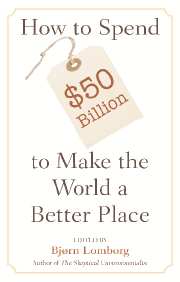Book contents
- Frontmatter
- Contents
- Contributors
- Introduction
- 1 Meeting the Challenge of Global Warming
- CLIMATE CHANGE – OPPONENTS' VIEWS
- 2 Communicable Diseases
- COMMUNICABLE DISEASES – OPPONENTS' VIEWS
- 3 The Challenge of Reducing the Global Incidence of Civil War
- THE CHALLENGE OF CONFLICTS – OPPONENTS' VIEWS
- 4 Toward a New Consensus for Addressing the Global Challenge of the Lack of Education
- THE CHALLENGE OF LACK OF EDUCATION – OPPONENTS' VIEWS
- 5 The Challenge of Poor Governance and Corruption
- THE CHALLENGE OF POOR GOVERNANCE AND CORRUPTION – OPPONENTS' VIEWS
- 6 Hunger and Malnutrition
- HUNGER AND MALNUTRITION – OPPONENTS' VIEWS
- 7 Population and Migration
- POPULATION: MIGRATION – OPPONENTS' VIEWS
- 8 The Water Challenge
- THE WATER CHALLENGE – OPPONENTS' VIEWS
- 9 Subsidies and Trade Barriers
- SUBSIDIES AND TRADE BARRIERS – OPPONENTS' VIEWS
- Expert Panel Ranking
- Index
CLIMATE CHANGE – OPPONENTS' VIEWS
Published online by Cambridge University Press: 27 July 2009
- Frontmatter
- Contents
- Contributors
- Introduction
- 1 Meeting the Challenge of Global Warming
- CLIMATE CHANGE – OPPONENTS' VIEWS
- 2 Communicable Diseases
- COMMUNICABLE DISEASES – OPPONENTS' VIEWS
- 3 The Challenge of Reducing the Global Incidence of Civil War
- THE CHALLENGE OF CONFLICTS – OPPONENTS' VIEWS
- 4 Toward a New Consensus for Addressing the Global Challenge of the Lack of Education
- THE CHALLENGE OF LACK OF EDUCATION – OPPONENTS' VIEWS
- 5 The Challenge of Poor Governance and Corruption
- THE CHALLENGE OF POOR GOVERNANCE AND CORRUPTION – OPPONENTS' VIEWS
- 6 Hunger and Malnutrition
- HUNGER AND MALNUTRITION – OPPONENTS' VIEWS
- 7 Population and Migration
- POPULATION: MIGRATION – OPPONENTS' VIEWS
- 8 The Water Challenge
- THE WATER CHALLENGE – OPPONENTS' VIEWS
- 9 Subsidies and Trade Barriers
- SUBSIDIES AND TRADE BARRIERS – OPPONENTS' VIEWS
- Expert Panel Ranking
- Index
Summary
In his challenge paper, William Cline paints a picture of severe long-term economic damage that would result from climate change if mankind does not take decisive action to reduce greenhouse gas emissions in the near future. His preferred option is the introduction of aggressive carbon taxes which would rise steadily over the next two to 300 years. Robert Mendlesohn, in his opposition paper, takes issue with the logic and analysis that leads Cline to these conclusions.
In Mendlesohn's view, Cline makes the mistake of proposing very costly (and economically damaging) strategies in the short term to tackle potential problems that might result from the action of future generations. He thinks it would be fairer for those costs to be borne by those generations causing the problem, if they so choose.
Economists use a process called discounting to compare costs and benefits over time. This accounts for the commonsense fact that it is only worthwhile spending money now if it produces future benefits greater than the interest which could be gained by saving it. Because Cline believes that climate damage in the far future is so important, he sets an artificially low discount rate so that the cost of damage appears large in present-day terms.
Another flaw is his reliance on older studies for estimates. More recently, there is systematic evidence from the literature that likely climate damage had previously been overestimated, since studies had failed to allow for adaptation and climate benefits.
- Type
- Chapter
- Information
- Publisher: Cambridge University PressPrint publication year: 2006

